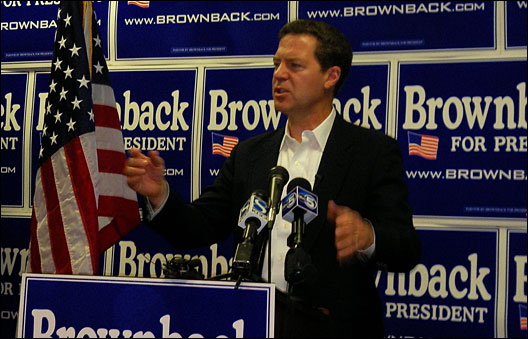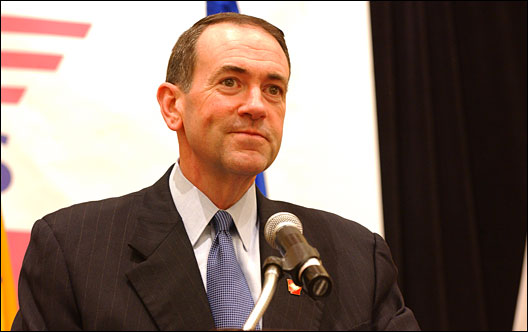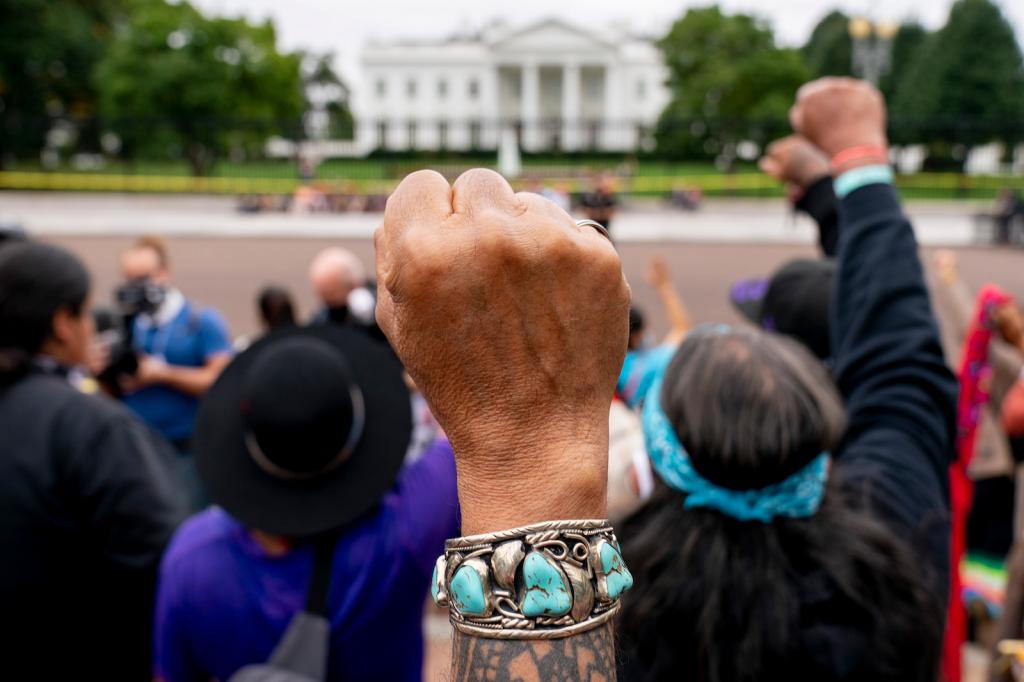
This is part of a series of interviews with presidential candidates produced jointly by Grist and Outside.
Update: Sam Brownback dropped out of the presidential race on Oct. 19, 2007.

“America is on the verge of an energy crisis,” Sen. Sam Brownback (R-Kan.) warns on his presidential campaign website, blaming “years of neglect and shortsighted domestic policies.”
His solution? Incentivize the marketplace to develop more nuclear power, more renewables, plug-in hybrids, better biofuels, and other homegrown energy sources and technologies. Brownback has been a big advocate of ethanol and other biofuels throughout the decade he’s spent representing Kansas in the U.S. Senate — no surprise, considering that he hails from the heartland.
On the question of climate change, Brownback believes the atmosphere is warming but hedges on whether human activity is responsible. He does talk about wanting to reduce carbon dioxide emissions, but he talks a lot more about wanting to increase domestic energy supplies.
Brownback hasn’t won much applause from enviros during his tenure in Congress; the League of Conservation has given him a lifetime environmental voting score of 14 percent. But he has pushed climate-friendly farming practices, international forest conservation, and, recently, a modest increase to fuel-economy standards.
I called up Brownback on the campaign trail in Iowa to get a clearer read on where he stands on matters green.
For more info on his platform and record, check out Grist’s Brownback fact sheet.
What makes your energy platform stronger than the other candidates’?
I think it is realistic. I think it is doable. I think it will reduce our dependence on foreign oil, and reduce the carbon dioxide emissions from the car fleet. It is a comprehensive proposal that we can do.
You have said that America is on the cusp of an energy crisis. What do you mean by this, and what do you plan to do about it?
We are too dependent upon foreign oil. We are subject to threats from people like [Venezuelan President Hugo] Chavez and [Iranian President Mahmoud] Ahmadinejad. We need to take care of our own security by developing our own energy resources, and we need to do so in a fashion that is environmentally sound and economically workable. We need to reduce our dependence on foreign oil and reduce our consumption of oil.
The centerpiece of this is really trying to push forward this next wave of technology, like plug-in cars that go their first 20 to 30 miles on electricity instead of gas.
How do you propose to achieve energy independence?
I note that we must be energy secure, not independent, because I don’t think we will be independent. But we need to be in a spot in 15 years where if somebody threatens [to cut off oil supplies] from Russia, Iran, Saudi Arabia, or Venezuela, it doesn’t cripple us. We need to include Canada [in our plans for energy security], particularly the oil-sands areas in Canada.
The solution is also ethanol from cellulosic bases, it is biodiesels, it is plug-in technology and the use of electricity to reduce our need for petroleum in the car fleet.
What do you think is the most important environmental issue facing the nation?
It is probably our consumption of foreign oil — the huge quantity, the dependency — and what comes out of doing that.
Do you believe that humans are the drivers of the recent climate warming trends?
We have warming trends, we have CO2 emissions that have grown, and carbon dioxide loading has been taking place in the atmosphere. I think those trends are connected, and I think we should work together to try to reduce them. I am pushing a market-based route to reduce carbon dioxide emissions.
Do you support a mandatory cap on greenhouse-gas emissions?
I really believe that the route for us to go to accomplish the most is an incentivized marketplace, not regulation. Markets are much more efficient at moving this forward.
How do you propose to reduce CO2 emissions?
I think one of the key routes is reducing the oil consumption of the car fleet in this country. I would like to see us incentivize the move toward more electricity in the car fleet, with tax credits both at the production and buyer levels.
I support strongly the expansion of nuclear power generation, because that is one of the key ways of getting electricity generated and reducing carbon dioxide emissions. Also wind power — I think we can get more renewable fuels into our electricity production.
I want to add that tree destruction and burning has been one of the lead carbon dioxide emitters in the world. I would like to see us use tax credits and incentivize people to create carbon sinks in this country or around the world, so that instead of burning trees you are stimulating their production, or even just allowing rainforests to grow back into trees. In the Atlantic rainforest area of Brazil, for instance, the Nature Conservancy is working with a group of companies to buy back former forestland that has been used for agriculture. They’re letting it grow back into forests — a great way to create a massive carbon sink.
How would you address the problem of storing nuclear waste?
I supported the [Yucca Mountain] site that we are developing in Nevada for taking care of nuclear waste. That has been blocked legislatively a number of times. I think it’s also worth taking a look at on-site storage of nuclear waste or reprocessing of nuclear waste.
You emphasize a cleaner, more efficient automobile fleet. Would you support an increase in fuel-economy standards?
There was a compromise worked out this last time around that seemed to me a workable solution. [Editor’s note: This provision, in an energy bill passed by the Senate in June 2007, would require cars and light trucks sold in the U.S. to get an average of 35 miles per gallon by 2020.] I have not in the past supported an increase in the CAFE standard — I really thought that we should move there with market forces. But this was something that the companies themselves thought that they could get done and it seemed reasonable.
I want to note that I am not shifting positions on CAFE. If this was something that the manufacturers themselves didn’t think they could get to, I wouldn’t be supportive of it, because I think we need to work together on these things, not try to regulate. I want us to work together particularly on this plug-in technology, and do that through tax credits and incentivizing in the marketplace, not by regulation.
What role do you think coal should play in America’s energy future?
I think it is key. It is our biggest source of energy from a carbon basis that we have in the country. We have a 200- to 300-year supply. The issue I think for most people has been the carbon dioxide emissions from coal, but I don’t think we can break off of [coal use], and I don’t think we should break off. We are going to have to find ways to have cleaner burning of coal. Some people are trying to find ways to do CO2 sequestration from coal. That, it looks to me, is a ways off.
Do you see liquefied coal as an important alternative fuel to pursue?
I think so. For us to become energy secure in North America in 15 years, you are likely looking at that as one of the key phases.
You mentioned energy-efficient cellulosic ethanol. Do you think we need to shift from corn ethanol to cellulosic, and if so, how would you encourage this?
I think we need to get [cellulosic] plants up and running. Experts who I’ve talked to about cellulosic ethanol think that we clearly can do it, but people don’t know if we can scale it up to a production level. The Department of Energy did the initial grants on cellulosic plants to get them started and see if we can make this work or not. I think this is a good route to go. It looks like we need research particularly on the enzymes and yeast used to break down the cellulose — that is something that we can help fund.
The U.S. consumes far more energy than any other country. Do you believe we have a moral obligation to take the global lead in curbing our energy use and carbon dioxide emissions?
I am one who believes that the market, properly incentivized, can consistently outperform government regulation on achieving objectives. What I would like to see us do is incentivize with tax credits, incentivize cellulosic ethanol and biodiesel for some period of time, and support research. I think those are ways that we can rapidly move forward.
We should also work with the developing economies to support tree planting and reducing deforestation. Twenty-two percent of carbon dioxide emissions are coming from deforestation. Why not use our tax credits and our economy to encourage projects like the Brazil model I mentioned? That can be a fabulous connection that everybody can feel good about. Then those developing countries wouldn’t be saying that we are trying to hold them back. No, we are going to use our economic activity to support and stimulate theirs.
You often invoke your faith when addressing environmental stewardship. How do these issues connect for you?
We were given a great place to live, a great planet. We ought to take care of the place that God has given us to be. I think we can be environmental stewards in a way that is positive for people and positive for the environment. I think humans are sacred and part of the total environment.
What environmental achievement are you proudest of?
The growth in ethanol and biodiesel is something that I have worked on since I was secretary of agriculture in Kansas. I would like to see a lot more progress because I think there is a real score to be made on this.
I have been a long-term environmental advocate for the agriculture industry. I have particularly tried to push carbon farming or carbon sequestration.
Who is your environmental hero?
I am an admirer of Sen. Gaylord Nelson who started Earth Day, for taking a simple concept and getting people to engage it.
Actually, the people I see doing the most on the environment right now are generally young people in grade school and high school. They tend to be more my heroes on it because they are just so clean-hearted and passionate about it. It really stimulates a lot of my interest in these issues.
If you could spend one week in a park or natural area of the United States, where would it be?
The Tallgrass Prairie [National Preserve] in Kansas, which is really a small park and a large privately held area. I find the prairies fascinating — they have such an integrated life as far as the plants, the bacteria, the animals. I think it is a beautiful landscape.
What have you done personally to reduce your environmental footprint?
We have two hybrid cars in our family, and I love the technology. We just did an energy audit of our home to try to figure out where our holes are. We haven’t implemented the follow-up on that yet.
Some of my farmland we have put in the Conservation Reserve Program, though I get paid from the government to do that. I try to garden organically but I don’t get it done every year, so I use chemicals once in a while on my garden.
Can you describe your most memorable outdoor experience?
It’s probably when I went to Sudan and northern Kenya. Outside in the night sky, the stars were just more brilliant than any other place. That may be the most memorable outdoor experience — those stars in Africa.

